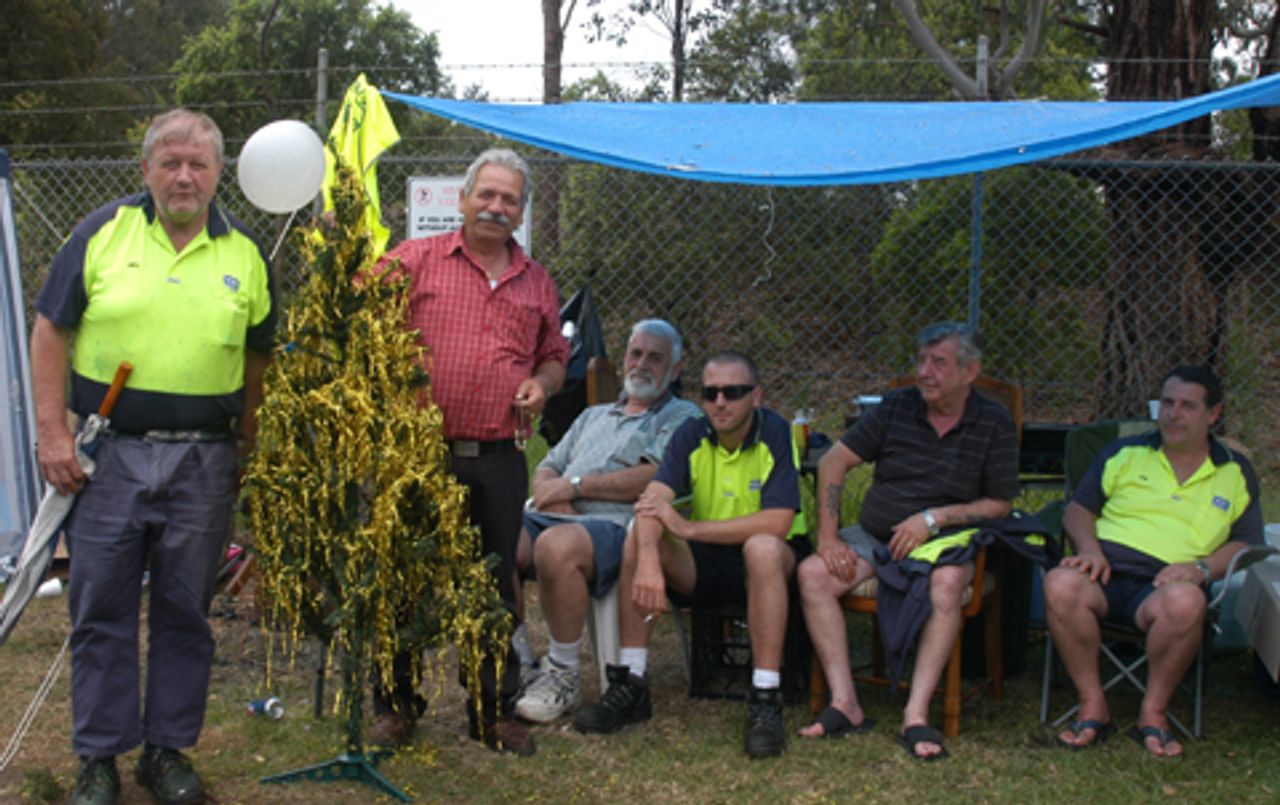Over 400 Visy Board workers began an indefinite strike in Sydney and Melbourne on December 3 in response to the packaging company’s attempts to expand casual employment and undermine job security and conditions in the latest enterprise bargaining agreement (EBA).
Visy, the world’s largest privately-owned paper recycling and packaging corporation, wants to increase the number of casuals and pay them about $15 per hour, far less than current casual rates and half the average $30 an hour that permanent employees receive. The decision to walkout was unanimous and made at national 24-hour stop-work meetings on November 29.
Visy Board workers are currently picketing the Warwick Farm and Smithfield plants in Sydney and the Dandenong factory in Melbourne, with overtime bans at the company’s Western Australian and Queensland operations.
 Warwick Farm picket line
Warwick Farm picket lineThe strikers produce cardboard boxes for Coca Cola Amatil, Foster’s breweries, Nestlé and other major food and beverage manufacturers. The Australian Manufacturing Workers Union (AMWU) has asked for a 5 percent annual pay increase over three years, improved casual rates and the introduction of a heat policy for extreme summer days. The previous EBA expired on September 30.
Visy has rejected these demands outright over the past two and half months, and according to the AMWU “closed the door on negotiations”. In a deliberate provocation, the company has approved the 15 percent wage increase over three years for employees at its non-union plants.
Visy’s demand for more casual employees is in line with attacks on permanent jobs and conditions nationally and internationally. Over the past 15 years there has been growing casualisation of the Australian workforce. Even before the global financial crisis, according to 2008 Australian Bureau of Statistics figures, one in every four of Australia’s 9.3 million workers or 2.1 million employees worked on a casual basis and did not have paid leave entitlements. The majority of these were employed in the transport, sales, retail and hospitality sectors, or as labourers, earning between $17 and $22 an hour.
The Visy strike has erupted as employer groups increase demands for the Gillard Labor government to “review” its Fair Work legislation and impose even harsher measures to prevent or restrict workers taking industrial action.
Specifically citing the Visy strike, the Australian Financial Review yesterday declared that Labor’s workplace laws had “made it easier for unions to strike”. The newspaper quoted Australian Chamber of Commerce and Industry spokesman David Gregory who declared that “the boundaries of the Fair Work Act [were being] pushed further by the unions.” The Australian Retailers Association said the laws had to be reviewed to “deliver productivity, growth and sustainable Australian businesses”.
The Fair Work Act prohibits industrial action outside EBA negotiations, and even then requires secret postal ballots. The newspaper reported that more than 270 secret ballots to approve industrial action had been held since July 1. Rather than “pushing the boundaries”, however, the unions have systematically enforced Labor’s laws to try to contain, isolate and betray this growing resistance to the employers’ offensive.
Visy workers were directed by the AMWU on November 29 to give 72-hours advance notice of the current strike action. As a result, Visy was able to prepare for the walkout.
Another example of the role being playing by the union is the ongoing strike at Prysmian cable makers in Liverpool, just a few kilometres from the Warwick Farm Visy plant. About 200 Prysmian cable workers have been on strike since October 25 after management demanded the right to hire casual workers at $15 an hour and introduce “flexibility” arrangements to force employees to work on weekends and public holidays without penalty rates. Prysmian also demanded a drastic cut in redundancy payments.
Far from unifying and mobilising workers to defeat the employers’ offensive, the unions have kept every struggle isolated and trapped within the narrow framework of enterprise bargaining, in line with Labor’s laws.
Visy is notorious for its provocative attacks on workers’ jobs and conditions. In July 1999 the company suspended two forklift drivers at Warwick Farm for imposing union bans during an enterprise bargaining dispute. Visy then mobilised helicopters, security guards, police and the courts in an attempt to break the resulting strike action that demanded reinstatement of the suspended workers. The company suspended six more employees and sent dismissal notices to three others.
In November 2006, workers walked off the job at 12 Visy plants in protest over moves by the company to cut off salary payments for injured and ill workers. In September last year, management locked-out 100 employees at its food packaging plant at Coburg in Melbourne in a dispute over a new EBA.
John Brownlea, who has worked for Visy at Warwick Farm for 20 years, told the WSWS: “I don’t think the union is doing enough here. I don’t have all the answers but they need to be pushing harder on this.
“This is about a whole series of things—casuals, manning levels, wages and generally our rights at work. Visy wants to reduce the manning levels and I’ve heard they want to cut the number of forklift drivers, get rid of operators’ jobs and get everyone working harder. I’m a machine operator and they want to cut back there.
“The problem is that it’s only Melbourne and Sydney on strike. The others in Western Australia and other places just have overtime bans. These people should be called out on strike and although that might happen this week, we’re not really told much here.”
Another Visy employee from Warwick Farm, who wanted to remain anonymous, has worked for the company for over 30 years. “This was a good place in the early days but it started to change about 15 years ago with staffing and things like that,” he said. “In the early days I don’t think there were any casuals here—everyone was permanent—but as people leave or retire for various reasons they just bring in casuals.
“Casualisation is a serious issue as far as I’m concerned. There are a lot of guys here who live from pay to pay and are starting to do it tough. We want to create a decent workplace and jobs for our children and grandchildren but the company doesn’t want to come to the party.
“What sort of a future can you build on a casual wage? If people are employed as casuals here for more than three months, they have to be made permanent. So the company just gets rid of them and brings in others. This is hopeless, but obviously the company thinks it’s a worthwhile exercise because they don’t have to pay them long-service or other conditions.”
Another striker said it “outrageous” that Visy was attempting to undermine jobs and conditions when it had been found guilty and fined millions of dollars for price-fixing. In 2007 Visy and its competitor Amcor were convicted over a $36-billion price fixing deal. The following year, Visy owner Richard Pratt, one of Australia’s richest individuals, was charged with lying about his knowledge of a price-fixing scandal. The charges were dropped the day before he died in April 2009.
 Rod Kennedy
Rod KennedyRod Kennedy, an electrician who previously worked in construction, told the WSWS: “We weren’t happy to go on strike just before Christmas but if you want to get what you want you’ve got to be prepared to do these things. Our EBA finished on October 1 and the union negotiators started meeting the month before that. We will stay out until they give us what we think is fair.”
While Visy Board workers are determined to defend their jobs and conditions, the AMWU has made no move to call out workers in other Visy divisions or to appeal to all AMWU members, and packaging industry workers internationally, to back the Visy workers.
In order to defeat the employer offensive, Visy Board workers have to organise independently of the AMWU and other unions by establishing rank and file committees to appeal for support at all Visy plants and to campaign for backing throughout the working class. This struggle requires a socialist perspective, based on the fight for a workers’ government to place the major corporations, like Visy, under public ownership and the democratic control of the working people.
